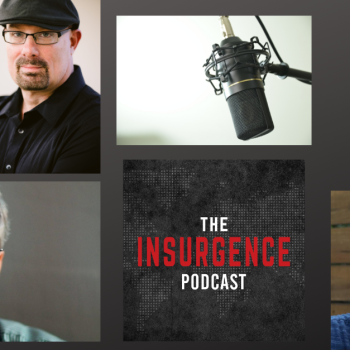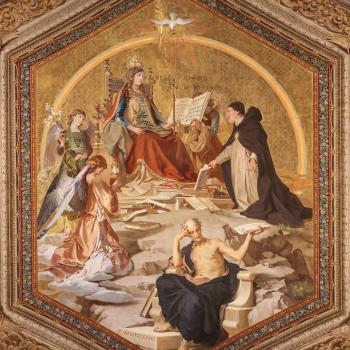Churches spend a lot of time and energy strategizing how best to be the church, the body of Christ on earth. Committees meet, books are read, websites scoured, congregations visited, consultants consulted—all with a view toward figuring out the best way to build community, spread the gospel, feed the hungry, make peace, and care for the poor and sick. Yet despite all this time, energy, and effort, surprisingly few of these same churches ever conclude that the best way to accomplish Jesus' mission is Jesus' way. Like the way he told his disciples in Luke's gospel: "Take nothing but a walking stick, no food, no bag, no shoes, no change of clothes, not a dime to your name. Live like lambs among wolves. Wherever you go, stay there until it's time to leave. And if anybody refuses to welcome you, shake the dust off your feet as a testimony against them. Warn them that the Kingdom of God is near."
It worked of course. The disciples returned and reported to Jesus how the gospel had spread, the poor were fed, people repented, the sick were healed. Not that any of this matters. What church or parachurch agency, or even faithful individual in their right mind, would ever take Jesus' instructions so literally anymore?
However, verbatim compliance with Jesus' commands was the hallmark of St. Francis of Assisi, the 13th-century mystic who turned medieval Europe on its head by doing nothing more than simply and humbly emulating Christ.
Francis was born and raised the spoiled son of a rich cloth merchant in 12th century suburban Italy. He was known throughout his youth as a party animal, reportedly labeled "the very king of frolic." No one liked a good time more. Cocky, brash, and impetuous, Francis once joined up with a group of his Assisi buddies to take on the Perugians, a rival gang of sorts from a nearby town. The rumble didn't go so well. Francis was beaten up pretty badly and taken hostage. He remained hostage for more than a year while his dad worked to come up with ransom. Then, after his release, Francis contracted some nasty fever that took yet another year to recover from.
However it was during these dark, difficult days that something inside Francis started to shift. He turned to God. One day while on his knees in this dilapidated church on the edge of town, Francis heard Jesus speak to him three times from the crucifix, "Francis, go repair my house which is falling completely into ruin." Looking around, Francis figured Jesus to be talking about the little run-down church he was praying in. Taking Jesus literally, as he would do for the rest of his life, Francis went off and sold off some of his father's expensive cloth to pay for repairs.
However Francis' dad went ballistic and hauled Francis down to the local bishop, intent on forcing Francis to pay the money back, and according to some accounts, forego his inheritance for acting so impulsively and passionately. Right then and there, impulsively and passionately, Francis took off his clothes and laid them neatly in a pile before his father. "Up to this point I have called you my father on earth," he said, "henceforth I desire to say only 'Our Father who art in Heaven.'" Not long afterward, Francis heard read from the gospel of Luke: "Take nothing for the journey except a walking stick—no food, no bag, no shoes, no change of clothes, not a dime to your name. Lambs among wolves." From that day forward Francis owned nothing and became nothing in obedience to Christ; and out of his nothingness, European medieval spirituality was transformed.
Francis lived in an era, like so many, where greed and political power contaminated the church. Christianity became so entangled with culture that it lost all of its bite and ability to inspire anything more than jaded indifference from the pews. Into the midst of this Francis walked, radically committed to a simplicity and humility so stark and so engaging that people could not help want a piece of it. The gospel takes on irrepressible power whenever Christians actually live it out. As one contemporary put it, because of St. Francis, "men and women, rich and worldly renounced possessions and, for the love of Christ, turned their backs on the world." Francis and his Franciscan adherents ignited an enormous, widespread religious revival. "Start by doing what's necessary," Francis said, "then do what's possible; and suddenly you are doing the impossible."
Typically the image that comes to mind when thinking of St. Francis is either some ceramic lawn ornament or that of a docile, sprouts-eating peacenik, clothed in hooded burlap and Birkenstocks, playing with the birds and padding about in flowered fields—just praising God for the sunshine. True, Francis did wear hooded burlap (or something close to it). And he was a peacenik. "While you are proclaiming peace with your lips," he said, "be careful to have it even more fully in your heart."





